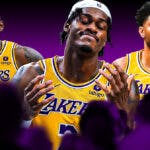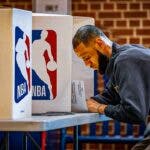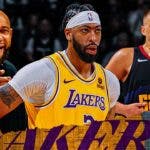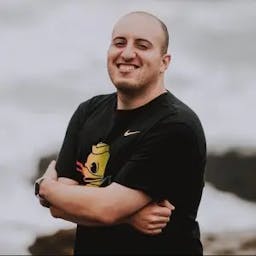Kobe Bryant was a special star waiting to shine on the biggest stage.
That much was evident from his days at Lower Merion High School in the suburbs of Philadelphia, a city he called home despite his long upbringing in Italy. Philly was a city that made him tough and gritty and would encompass all we know about the Los Angeles Lakers legend.
On Sunday morning, Kobe died in a helicopter crash along with his 13-year-old daughter Gianna and seven other passengers inside his privately owned Sikorsky S-76 chopper when it crashed into a hillside in Calabasas.
The NBA family has been in mourning since.
To remember Kobe Bryant's life is to reminisce about what made him such a special player, but most importantly what made him so unique as a human being.
Bryant was drafted with the 13th pick in the 1996 NBA Draft by the Charlotte Hornets, then soon after he was traded to the Los Angeles Lakers, with whom he would spend most of his adult life during his 20 seasons in the league.
At the time, he became the youngest player to play in the NBA (18 years, 72 days) and then the youngest to start (18 years, 158 days) in a game. He first backed up Eddie Jones and Nick Van Exel during his rookie year, but quickly started to make an impact as an undeniable talent. Come February, he became the youngest Slam Dunk Contest champion at the ripe age of 18, shocking the NBA with his flair and athletic ability:
The Lakers advanced to the Western Conference Semifinals that season and faced a well-established Utah Jazz team. He was thrust into a lead role in Game 5 of that series with Byron Scott missing the game with a wrist sprain, shooting four airballs in the clutch once his teammate Shaquille O'Neal had fouled out of the game.
While disappointing, no moment would encompass who Bryant was as a player more than that overtime loss that eventually eliminated the Lakers, 4-1.
Kobe airballed a game-winning 2-point jumper and then drew nothing but air on three 3-point field goals in overtime, including two potential game-tying shots in the final minute. In the postgame comments, O'Neal said Bryant “was the only guy who had the guts at the time to take shots like that” — something that would forever mark who he was as a competitor.
Fast-forward to 1999 and Bryant had become a star shooting guard in the league, honored with All-NBA and All-Defensive accolades. Yet it was Phil Jackson coming in as the new coach who changed it all, putting Bryant on a winning path and helping him capture his first title.
The Lakers steamrolled their way to a three-peat from 2000-02, making Bryant a bona-fide star and the clear heir to Michael Jordan, his longtime childhood icon.
The purple and gold momentarily fizzled out after that, as rumors of Bryant's incompatibility with Shaquille O'Neal and his “uncoachable” ways became prominent. Following a loss to the Detroit Pistons in the 2004 NBA Finals, O'Neal was traded to the Miami Heat and Bryant put rumors of a departure away by signing a seven-year deal to remain with the Lakers.
The road would be tough for Bryant (don't forget about the 2007 trade request) until he was able to find another sidekick in Pau Gasol in 2008, though the result was a 4-2 loss to the mighty Boston Celtics in the NBA Finals that season. The Lakers would rebound to win back-to-back titles in 2009 and 2010, and while Bryant would chase the sixth to tie MJ, the opportunity was never in the cards to get it:
https://youtu.be/A15wzmaiIq8?t=46
Bryant finished his career with five rings, an MVP, two Finals MVPs, four All-Star MVPs, and 18-time All-Star nods as part of an endless regalia of accolades that make him a surefire Hall of Famer, which chairman Jerry Colangelo assured on Monday ahead of the much-awaited enshrinement ceremony later this year.
Yet what made Kobe Bryant such an exceptional player went beyond what the numbers provided.
Bryant faced a wave of criticism after those airballs as a rookie in the playoffs, then internalized it, went back to the gym, and worked tirelessly to never airball those shots again.
He didn't double-guess his decision to take those clutch shots, but instead worked at his craft, perfecting it, and borrowing from other greats like Jordan and Julius Erving and stealing a few patterns from others like Penny Hardaway and Grant Hill.
He was known as a maniacal competitor, one that the NBA had not seen since Jordan himself. He was a constant gym rat, determined to outwork everybody from a bona-fide starter to even the last guy on the bench — all in search of greatness.
Bryant forged what later became known as the “Mamba Mentality” — a state of thought that combines individual skill, determination, and the unequivocal belief that hard work and dedication will reap unbelievable fruits of glory.
Players like DeMar DeRozan, Devin Booker, and Jayson Tatum have notoriously patterned their game after Bryant, much like The Black Mamba himself took after other greats before his time. Always learning, always evolving:
Kobe Bean Bryant was more than a three-peat, more than 81 points in a game, more than a 60-point game to cap off his career — the greatest farewell game ever. He was the quintessential competitor, willing to go to extreme lengths to improve himself into the most lethal of weapons, never hesitating to showcase the full array of his skills.
Following his retirement in 2016, Bryant showed a very different side of himself, one that was determined to continue his legacy as an ambassador of the game. He gave back by inculcating his daughter Gianna with the fundamentals of the game, being there for her basketball games, and even immersing her into the NBA world to meet the likes of her idol Trae Young and many other players.
Kobe Bryant was just as determined to be the best father to his daughter as he was to become the best player during his long NBA career, and that should be part of his ongoing legacy as he's enshrined alongside some of the game's greats in the upcoming Naismith Memorial Basketball Hall of Fame's Class of 2020.
Bryant was ruthless and unapologetic. He was demanding of others as much as he was of himself. He had his share of legal turbulence (he had a criminal sexual assault case dropped in 2004, and the subsequent civil case was settled in 2005) and beef with NBA players like Ray Allen, Karl Malone, and even former teammate Shaquille O'Neal.
He was often viewed as standoffish and at times unapproachable. He was an imperfect being, like most of us. But he was genuine to himself and to those close to him, never willing to sell an image that wasn't him.
His post-retirement life allowed us to see another side of him, a warmer side to the cold-blooded assassin that tortured so many NBA defenses throughout the years. This Kobe Bryant was loving, caring, and willing to pass on the secrets of his game to younger players who sought greatness:
https://www.youtube.com/watch?v=9saQ-4_8Csk
Bryant wrote a series of children's books and even produced an animated feature titled “Dear Basketball,” which won him an Oscar Academy award in 2018 — proving he was as much of a winner in his post-NBA life as he was during the 20 years of his life that he gave to the league.
Kobe Bryant was more than a childhood idol, more than just one of the many NBA legends who will forever grace Springfield once his name is inducted into the Hall of Fame. He was a fearless seeker of information, a willing giver, and a loving husband and father of four — one who was taken from this world much too soon.




